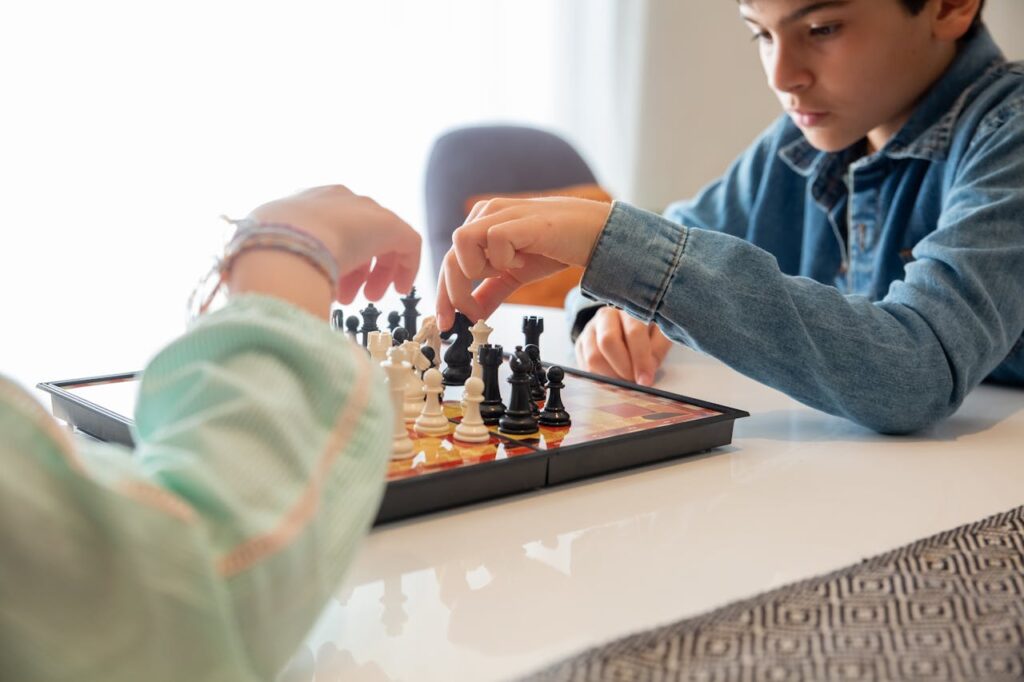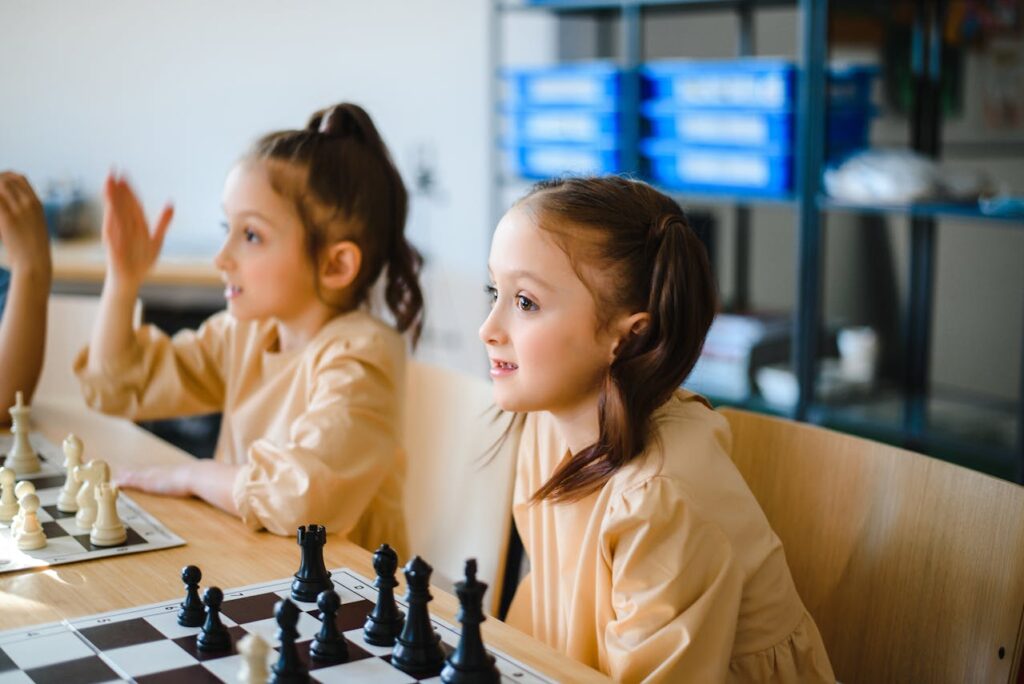Over the past few years, chess clubs have been popping up in schools all over the world, gaining popularity at an unprecedented rate. What once was considered a quiet, intellectual pastime has now become a vibrant part of school culture. But why is this happening? What makes chess clubs so appealing to students, teachers, and parents alike?
The answer lies in the numerous benefits that chess offers, both academically and socially. Chess clubs provide a space where students can develop critical thinking skills, improve their focus, and build strong friendships—all while having fun. As schools increasingly recognize these benefits, chess clubs are becoming a must-have extracurricular activity.
The Academic Benefits of Chess Clubs
One of the main reasons chess clubs are trending in schools is because of the clear academic benefits they offer. Chess is often referred to as a “gymnasium for the mind,” and for good reason.
The game exercises various cognitive skills that are crucial for academic success, making it an invaluable tool for students of all ages.
Enhancing Critical Thinking and Problem-Solving
Chess is a game of strategy, requiring players to think several moves ahead and anticipate their opponent’s actions.
This process involves deep critical thinking and complex problem-solving, skills that are directly transferable to the classroom.
When students regularly participate in chess clubs, they practice analyzing situations, considering multiple solutions, and making decisions based on logic and strategy.
These skills are not only important for excelling in subjects like math and science but also for approaching any problem in a thoughtful and methodical way.
Improving Concentration and Focus
In today’s world, where distractions are everywhere, the ability to concentrate is more important than ever.
Chess requires intense focus, as players must pay close attention to the board, think about their moves, and anticipate their opponent’s strategy.
This need for sustained concentration helps students develop the ability to focus for longer periods, a skill that is essential for success in school.
When students play chess, they practice tuning out distractions and staying engaged with a single task.
This skill directly translates to the classroom, where the ability to concentrate during lessons, homework, and exams can significantly impact a student’s academic performance.

Boosting Memory and Cognitive Function
Chess also enhances memory, which is another key factor in academic achievement.
To be successful at chess, players must remember the rules of the game, the moves of each piece, and often the strategies that they’ve seen or used in previous games.
This regular practice in remembering and applying information strengthens the brain’s memory functions.
Studies have shown that playing chess can improve both short-term and long-term memory.
Students who play chess regularly often find it easier to recall information in school, whether it’s memorizing historical dates, learning vocabulary words, or remembering the steps to solve a math problem.
Supporting Mathematical Thinking
There is a strong connection between chess and mathematics, which is one of the reasons chess clubs are so popular in schools.
Chess involves a lot of the same thinking processes as math, such as pattern recognition, logical reasoning, and problem-solving.
For example, in chess, players must constantly assess the board, calculate the potential outcomes of their moves, and consider various strategies.
This kind of thinking is very similar to the thought processes required in math, where students must analyze problems, calculate solutions, and apply formulas.
The Social and Emotional Benefits of Chess Clubs
While the academic benefits of chess are significant, the social and emotional benefits are equally important.
Chess clubs provide a space where students can connect with their peers, build self-confidence, and develop emotional intelligence.
Building Friendships and Social Skills
Chess clubs offer students a unique opportunity to build friendships and develop social skills in a supportive environment.
Unlike many other extracurricular activities, chess is a game that encourages interaction, communication, and collaboration.
In a chess club, students regularly play against each other, which helps them build connections with their peers.
They learn to engage in friendly competition, share strategies, and discuss the game in a way that fosters mutual respect and camaraderie.
This social interaction is particularly beneficial for students who may struggle to make friends in other settings, as it provides a structured, positive environment for building relationships.
Developing Patience and Emotional Resilience
Chess is a game that requires patience and emotional control. Players must wait their turn, think carefully about their moves, and sometimes endure long games without losing focus or getting frustrated.
This need for patience helps students develop emotional resilience, a key factor in handling the ups and downs of life.
In a chess game, mistakes are inevitable. Even the best players make errors, and learning to recover from these mistakes is an important part of the game.
Chess teaches students that setbacks are a natural part of learning and that it’s important to stay calm, reflect on what went wrong, and try again.
This ability to bounce back from failure is a critical life skill that helps students handle challenges in school and beyond.
Boosting Self-Confidence
As students develop their chess skills, they also build self-confidence. Each time they learn a new strategy, win a game, or solve a difficult puzzle, they experience a sense of accomplishment that boosts their self-esteem.
This growing confidence often extends beyond chess, helping students feel more capable and empowered in other areas of their lives.
Chess clubs provide an environment where students can take risks, make mistakes, and learn from them without fear of judgment.
This supportive atmosphere helps them build the confidence they need to tackle challenges both in and out of the classroom.
Encouraging a Growth Mindset
A growth mindset—the belief that abilities and intelligence can be developed through effort and learning—is crucial for lifelong success.
Chess naturally fosters this mindset by emphasizing the importance of practice, learning from mistakes, and continuous improvement.
In chess, there is always room for growth. No matter how skilled a player becomes, there are always new strategies to learn, new challenges to overcome, and new ways to improve.
Chess clubs encourage students to view their abilities as something that can be developed over time, rather than as fixed traits.
This mindset helps them approach challenges with optimism and persistence, both in chess and in their academic studies.
Why Schools Are Embracing Chess Clubs
With all the benefits that chess offers, it’s no surprise that schools are increasingly incorporating chess clubs into their extracurricular programs.
Chess clubs are more than just an additional activity; they are a strategic tool for enhancing the overall educational experience.
Supporting Holistic Education
Schools are recognizing the importance of holistic education—an approach that nurtures not just academic skills but also social, emotional, and cognitive development.
Chess fits perfectly into this model by providing a well-rounded educational experience.
While traditional subjects like math, science, and language arts are crucial, educators understand that students also need opportunities to develop critical life skills such as problem-solving, resilience, and collaboration.
Chess clubs provide a unique space where students can cultivate these skills in a fun, engaging way that complements their academic learning.
Enhancing Inclusivity and Accessibility
One of the great strengths of chess is its accessibility. Unlike many extracurricular activities that require specific physical abilities, expensive equipment, or prior experience, chess is a game that anyone can learn and play.
This inclusivity makes chess clubs an excellent option for schools looking to offer activities that are accessible to all students, regardless of their background or abilities.
Chess clubs provide a space where students from diverse backgrounds can come together, share a common interest, and learn from each other.
The game’s universal appeal makes it easy for students to connect, regardless of their age, gender, or socio-economic status.
This inclusivity helps build a sense of community within the school and encourages students to appreciate and respect each other’s differences.

Aligning with Educational Standards
As educational standards evolve, there is increasing emphasis on developing students’ critical thinking, problem-solving, and analytical skills—areas where chess excels.
Many schools are integrating chess clubs into their curricula or offering them as part of after-school programs because they align well with these educational goals.
For instance, the Common Core State Standards emphasize the importance of reasoning, problem-solving, and evidence-based thinking.
Chess naturally supports these skills by requiring students to analyze situations, make strategic decisions, and consider the consequences of their actions.
By participating in chess clubs, students practice these essential skills in a hands-on, engaging way.
Fostering a Positive School Culture
Chess clubs contribute to a positive school culture by promoting values like respect, fairness, and sportsmanship.
These clubs provide a structured environment where students learn to compete in a friendly and respectful manner, which can have a positive impact on the overall school climate.
In a chess club, students learn that winning is not everything—what matters is how you play the game.
This emphasis on fair play and respect for opponents helps create a culture of kindness and empathy within the school.
Students who participate in chess clubs often carry these values into other areas of their school life, leading to more positive interactions with their peers and teachers.
Encouraging Lifelong Learning
Chess is a game that can be played and enjoyed for a lifetime. By introducing students to chess at a young age, schools are encouraging a love of learning that can last well beyond their school years.
Chess teaches students that learning is a continuous process and that there is always more to explore, whether it’s mastering a new strategy, learning about the history of the game, or participating in tournaments.
For many students, chess becomes a lifelong passion that they continue to pursue as they grow older.
Schools that offer chess clubs are helping students develop interests and hobbies that can enrich their lives long after they’ve graduated.
How Chess Clubs are Adapting to Modern Education
As schools increasingly adopt technology and innovative teaching methods, chess clubs are also evolving to fit into this modern educational landscape.
The integration of technology, the rise of online chess platforms, and the growing emphasis on collaborative learning are all influencing how chess clubs operate today.
Integrating Technology into Chess Clubs
Technology has transformed the way students learn, and chess clubs are no exception.
Many schools are now using digital tools to enhance the chess-playing experience, making the game more engaging and accessible for students.
One of the most significant advancements is the availability of online chess platforms.
These platforms allow students to play against opponents from around the world, participate in online tournaments, and access a vast library of chess puzzles and tutorials.
This access to a global chess community helps students improve their skills while exposing them to different playing styles and strategies.
In addition to online platforms, many chess clubs are using software that provides real-time analysis of games.
These tools can analyze a student’s moves, highlight mistakes, and suggest alternative strategies, offering immediate feedback that helps students learn more effectively.
Blending Chess with Other Subjects
Another trend in modern education is the integration of chess with other subjects, creating a multidisciplinary approach that enhances student learning.
Schools are finding creative ways to incorporate chess into the curriculum, using the game as a tool to teach everything from math and science to history and language arts.
For example, some teachers use chess to teach mathematical concepts such as geometry and probability.
By analyzing the movement of pieces on the chessboard, students can better understand angles, spatial relationships, and the likelihood of certain outcomes.
This hands-on approach helps students see the real-world applications of mathematical principles, making the subject more engaging and relevant.
In history classes, students might study the origins and evolution of chess, exploring how the game has been played across different cultures and eras.
This not only enhances their understanding of history but also deepens their appreciation for the game itself.
Promoting Collaborative Learning
While chess is often seen as a solitary game, it actually offers many opportunities for collaborative learning.
Modern chess clubs are increasingly emphasizing teamwork and collaboration, encouraging students to work together to improve their skills and solve problems.
One way chess clubs promote collaboration is through team tournaments, where students compete in groups rather than individually.
These tournaments require students to strategize together, share their knowledge, and support each other, fostering a sense of camaraderie and teamwork.
Another collaborative approach is peer mentoring, where more experienced players help beginners learn the basics of the game.
This not only benefits the novice players but also helps the mentors develop leadership and teaching skills.
By working together, students create a supportive learning environment where everyone can grow and improve.

Fostering Inclusivity through Chess
Inclusivity is a major focus in modern education, and chess clubs are playing an important role in fostering a more inclusive school environment.
Because chess is accessible to students of all abilities and backgrounds, it provides an opportunity for everyone to participate and succeed.
Schools are increasingly recognizing the value of chess as an inclusive activity that can bring together students who might not otherwise interact.
In chess clubs, students of different ages, genders, and cultural backgrounds come together to share a common interest, creating a more diverse and inclusive community.
Moreover, chess clubs can be particularly beneficial for students with special needs.
The structured, rule-based nature of chess can provide a calming and focused environment for students who may struggle with more chaotic or unstructured activities.
The Future of Chess Clubs in Schools
As chess clubs continue to grow in popularity, they are likely to play an even more prominent role in education in the years to come.
The benefits of chess are well-established, and as more schools recognize the value of these clubs, we can expect to see even greater integration of chess into the school curriculum.
Expanding Access to Chess Education
One of the key trends we are likely to see in the future is the expansion of access to chess education.
This could involve offering chess clubs in more schools, particularly in underserved areas, where students might not have access to other extracurricular activities.
By making chess more widely available, schools can help bridge the gap for students who might not have other opportunities to develop critical thinking, problem-solving, and social skills.
In addition to expanding access to chess clubs, schools may also explore ways to integrate chess into the regular curriculum.
This could involve offering chess as an elective course, incorporating chess-related activities into math or science classes, or using chess as a tool for teaching social and emotional learning.
By making chess a more central part of the educational experience, schools can help ensure that all students benefit from the game’s many advantages.
Leveraging Technology for Chess Education
As technology continues to advance, we can expect to see even more innovative uses of digital tools in chess education.
Virtual reality (VR) and augmented reality (AR) could offer new ways for students to experience chess, making the game more immersive and interactive.
For example, students could use VR to explore famous chess matches from history, stepping into the shoes of legendary players and experiencing the game from their perspective.
AI-driven chess tutors and analysis tools are also likely to become more sophisticated, providing students with personalized feedback and guidance.
These tools could help students improve their skills more quickly and effectively, making chess education more accessible to learners of all levels.
Chess as a Tool for Social Change
As chess clubs continue to grow in popularity, they may also play a role in promoting social change.
Chess has the potential to bring people together across cultural, social, and economic divides, and schools can leverage this power to foster greater understanding and cooperation among students.
For example, chess clubs could partner with community organizations to host tournaments or events that promote social justice, equality, or environmental awareness.
These events could use chess as a platform for discussing important issues and encouraging students to think critically about the world around them.
Conclusion
Chess clubs are more than just a trend—they are a valuable addition to the educational landscape, offering a wide range of benefits for students of all ages.
From enhancing academic achievement to fostering social connections and promoting emotional resilience, chess provides a holistic educational experience that supports the development of well-rounded, capable, and confident learners.
As schools continue to embrace chess clubs, they are helping to create a new generation of thinkers, strategists, and problem-solvers.
By integrating chess into the school environment, educators are not only preparing students for success in the classroom but also equipping them with the skills they need to navigate the challenges of life.

